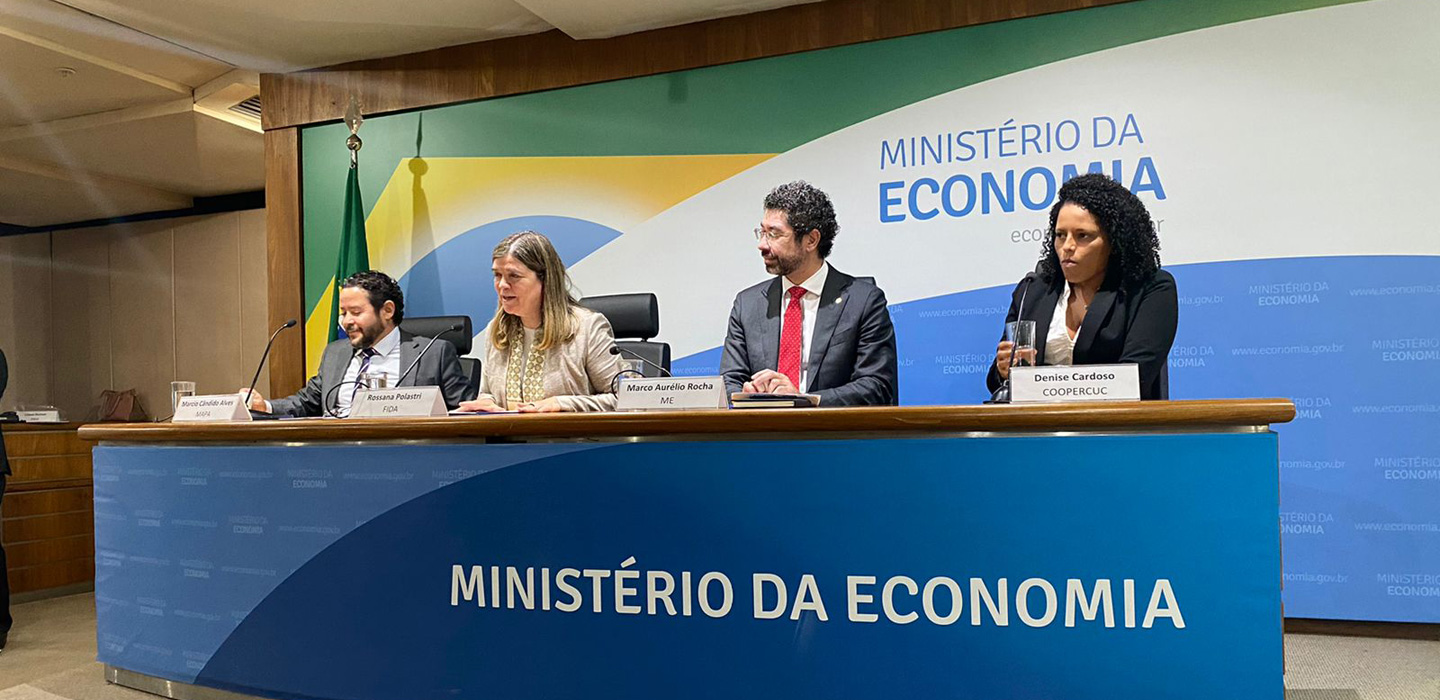More than 250,000 rural Brazilian families overcame poverty in 2016-2022 thanks to IFAD support
IFAD Asset Request Portlet
Agrégateur de contenus
More than 250,000 rural Brazilian families overcame poverty in 2016-2022 thanks to IFAD support
30 juin 2022
Rome/Brasilia, 30 June 2022 – Projects funded by the UN’s International Fund for Agricultural Development (IFAD) helped around 257,000 rural families to overcome poverty in Brazil from 2016 to 2022, according to a report on implementation of the guiding IFAD Country Strategy (or COSOP) for Brazil in 2016-2022, which was presented today to the Brazilian Government in Brasilia.
During that period, and thanks to IFAD’s capacity to convene multiple national cofinancers, the six rural development projects supported by the Fund invested a total amount of $453 million, of which $141 million came from IFAD, meaning that for every dollar invested in Brazil IFAD mobilized two additional dollars to foster rural development in the country’s most impoverished rural areas.
“Brazil is our biggest country programme in Latin America and the Caribbean, not only because of the size of the country and its economy, but the virtuous cycle it has created by placing high government priority on rural development and the excellent performance of the projects,” said Rossana Polastri, IFAD’s Regional Director for Latin America and the Caribbean. “This was possible due to the strong commitment of the federal and state authorities to family farming as a way for rural poor populations to lift themselves out of poverty, and the support of IFAD’s country team for Brazil.”
The projects’ achievements have been remarkable. The poverty rate among families participating families dropped from 50 per cent to 36 per cent, an impressive impact especially considering the strong drought that has hit the semi-arid Northeast in recent years and the effects of the COVID-19 pandemic. The COSOP Review Report considers that the execution of the strategy was relevant and effective.
The analysis offers hope at a difficult moment on the road towards the elimination of poverty in Brazil. After a drop in the poverty and extreme poverty rates during the years 2003-2014 from 41.7 per cent to 17.7 per cent, this trend has reversed in recent years, bringing the national poverty rate to 19.4 per cent in 2019, according to the OCDE´s Economic Survey of Brazil (December 2020).
Although Brazil is the largest economy in Latin America and the Caribbean, the country faces persistent inequality, with large pockets of poverty remaining throughout the country but especially in the Northeast-- home to almost 60 per cent of Brazilians living in extreme poverty.
The northeastern semi-arid region known as sertão has been the focus of IFAD-supported interventions. Nonetheless, the Fund has identified other regions with high proportions of people living in poverty and critical food insecurity rates as well. The most recent IFAD-supported project, the Amazon Sustainable Management Project (PAGES), has been developed to reduce rural poverty while decreasing deforestation and environmental degradation in that region. PAGES will soon start implementation in the Maranhão State’s Amazonian region.
IFAD’s 2016-2022 Strategy for Brazil defined three main objectives: improve agricultural production and family farmers’ access to markets to contribute to the country’s food and nutritional security; improve public policies and programmes dedicated to family farming; and strengthen the capacity of government institutions and rural organizations to implement policies and programmes.
Of the six investment projects implemented in the Northeast, three were recently completed, and PAGES will become fully operative by September this year. Five other projects are in the design and conceptualization phase.
IFAD’s COSOPs are medium-term strategies that identify the main development objectives and results that IFAD intends to achieve in each particular country. Jointly developed with national governments, COSOPs build on the countries’ development goals and rural poverty reduction strategies.
The report, prepared by the Latin American and the Caribbean Division, will incorporate the contributions of the Brazil Government and will serve as the basis for the preparation of the new country strategy next year.
Note for the editors:
Since the 1980s, IFAD's investments in Brazil have focused on rural development activities in the semi-arid northeaster region of the country, known as sertão. All IFAD-supported projects in the country focus on supporting and promoting family farming, especially among marginalized groups, such as indigenous and quilombolas (Afro-descendants) communities, agrarian reform settlers, women and youth.
The 13 IFAD-supported projects in the country have invested a total of $1.18 billion (with more than $297 million from IFAD) and have benefited some 615,400 households.
You can find more information about IFAD's operations in Brazil here.
You can read some life stories of how IFAD-supported projects are helping family farmers overcome the impact of COVID-19 and poverty here.
You can learn how IFAD-supported projects are helping to maintain Brazil's biodiversity in this video.
Press release No.: IFAD/40/2022
IFAD is an international financial institution and a United Nations specialized agency. Based in Rome – the United Nations food and agriculture hub – IFAD invests in rural people, empowering them to reduce poverty, increase food security, improve nutrition and strengthen resilience. Since 1978, we have provided more than US$23.2 billion in grants and low-interest loans to fund projects in developing countries. Last year, IFAD-supported projects reached an estimated 130 million people. A wide range of photographs of IFAD’s work in rural communities are available for download from its Image Bank.
